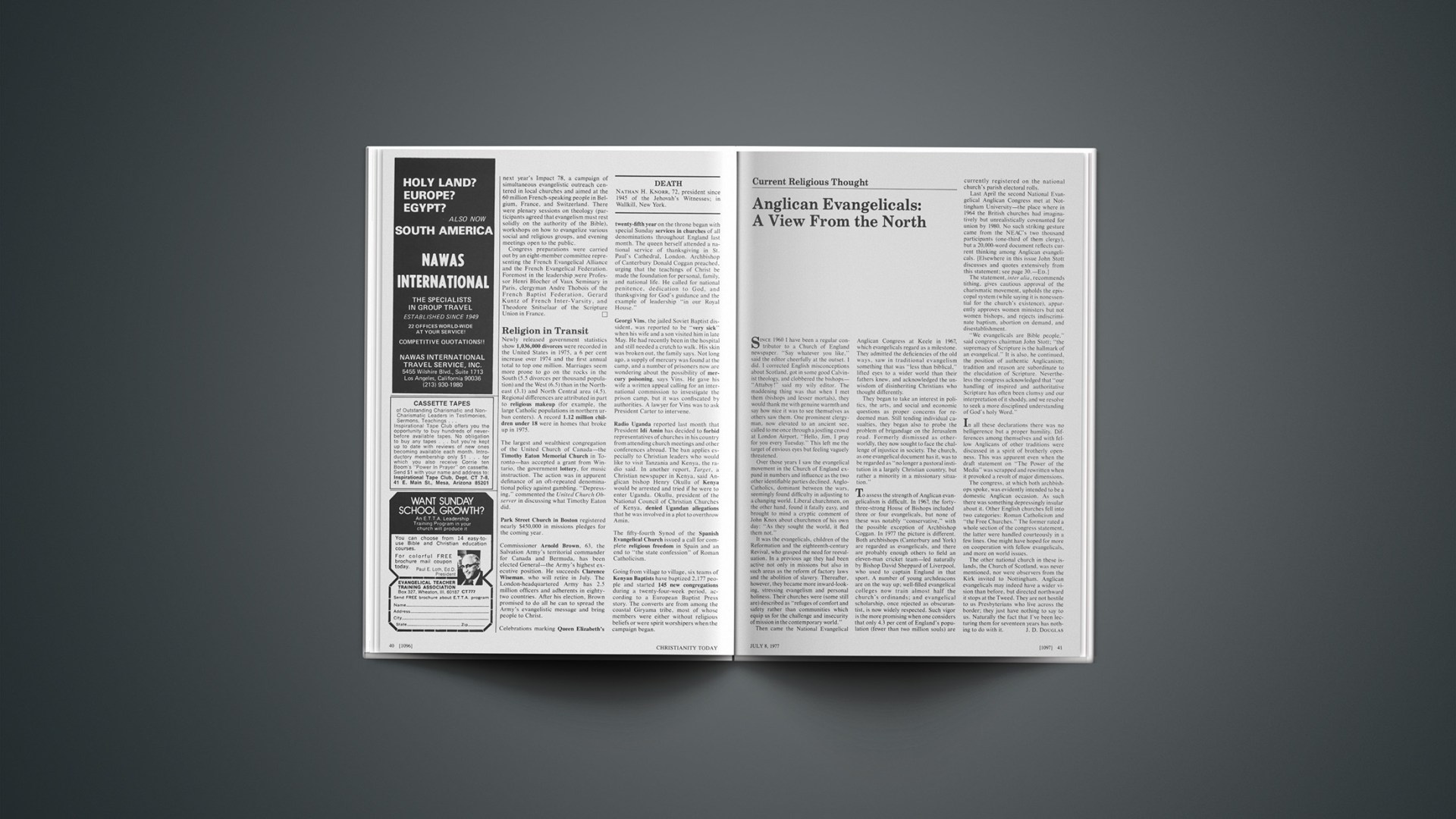Since 1960 I have been a regular contributor to a Church of England newspaper. “Say whatever you like,” said the editor cheerfully at the outset. I did. I corrected English misconceptions about Scotland, got in some good Calvinist theology, and clobbered the bishops—“Attaboy!” said my wily editor. The maddening thing was that when I met them (bishops and lesser mortals), they would thank me with genuine warmth and say how nice it was to see themselves as others saw them. One prominent clergyman, now elevated to an ancient see, called to me once through a jostling crowd at London Airport, “Hello, Jim, I pray for you every Tuesday.” This left me the target of envious eyes but feeling vaguely threatened.
Over those years I saw the evangelical movement in the Church of England expand in numbers and influence as the two other identifiable parties declined. Anglo-Catholics, dominant between the wars, seemingly found difficulty in adjusting to a changing world. Liberal churchmen, on the other hand, found it fatally easy, and brought to mind a cryptic comment of John Knox about churchmen of his own day: “As they sought the world, it fled them not.”
It was the evangelicals, children of the Reformation and the eighteenth-century Revival, who grasped the need for reevaluation. In a previous age they had been active not only in missions but also in such areas as the reform of factory laws and the abolition of slavery. Thereafter, however, they became more inward-looking, stressing evangelism and personal holiness. Their churches were (some still are) described as “refuges of comfort and safety rather than communities which equip us for the challenge and insecurity of mission in the contemporary world.”
Then came the National Evangelical Anglican Congress at Keele in 1967, which evangelicals regard as a milestone. They admitted the deficiencies of the old ways, saw in traditional evangelism something that was “less than biblical,” lifted eyes to a wider world than their fathers knew, and acknowledged the unwisdom of disinheriting Christians who thought differently.
They began to take an interest in politics, the arts, and social and economic questions as proper concerns for redeemed man. Still tending individual casualties, they began also to probe the problem of brigandage on the Jerusalem road. Formerly dismissed as otherworldly, they now sought to face the challenge of injustice in society. The church, as one evangelical document has it, was to be regarded as “no longer a pastoral institution in a largely Christian country, but rather a minority in a missionary situation.”
To assess the strength of Anglican evangelicalism is difficult. In 1967, the forty-three-strong House of Bishops included three or four evangelicals, but none of these was notably “conservative,” with the possible exception of Archbishop Coggan. In 1977 the picture is different. Both archbishops (Canterbury and York) are regarded as evangelicals, and there are probably enough others to field an eleven-man cricket team—led naturally by Bishop David Sheppard of Liverpool, who used to captain England in that sport. A number of young archdeacons are on the way up; well-filled evangelical colleges now train almost half the church’s ordinands; and evangelical scholarship, once rejected as obscurantist, is now widely respected. Such vigor is the more promising when one considers that only 4.3 per cent of England’s population (fewer than two million souls) are currently registered on the national church’s parish electoral rolls.
Last April the second National Evangelical Anglican Congress met at Nottingham University—the place where in 1964 the British churches had imaginatively but unrealistically covenanted for union by 1980. No such striking gesture came from the NEAC’s two thousand participants (one-third of them clergy), but a 20,000-word document reflects current thinking among Anglican evangelicals. [Elsewhere in this issue John Stott discusses and quotes extensively from this statement; see page 30.—ED.]
The statement, inter alia, recommends tithing, gives cautious approval of the charismatic movement, upholds the episcopal system (while saying it is nonessential for the church’s existence), apparently approves women ministers but not women bishops, and rejects indiscriminate baptism, abortion on demand, and disestablishment.
“We evangelicals are Bible people,” said congress chairman John Stott; “the supremacy of Scripture is the hallmark of an evangelical.” It is also, he continued, the position of authentic Anglicanism; tradition and reason are subordinate to the elucidation of Scripture. Nevertheless the congress acknowledged that “our handling of inspired and authoritative Scripture has often been clumsy and our interpretation of it shoddy, and we resolve to seek a more disciplined understanding of God’s holy Word.”
In all these declarations there was no belligerence but a proper humility. Differences among themselves and with fellow Anglicans of other traditions were discussed in a spirit of brotherly openness. This was apparent even when the draft statement on “The Power of the Media” was scrapped and rewritten when it provoked a revolt of major dimensions.
The congress, at which both archbishops spoke, was evidently intended to be a domestic Anglican occasion. As such there was something depressingly insular about it. Other English churches fell into two categories; Roman Catholicism and “the Free Churches.” The former rated a whole section of the congress statement, the latter were handled courteously in a few lines. One might have hoped for more on cooperation with fellow evangelicals, and more on world issues.
The other national church in these islands, the Church of Scotland, was never mentioned, nor were observers from the Kirk invited to Nottingham. Anglican evangelicals may indeed have a wider vision than before, but directed northward it stops at the Tweed. They are not hostile to us Presbyterians who live across the border; they just have nothing to say to us. Naturally the fact that I’ve been lecturing them for seventeen years has nothing to do with it.










